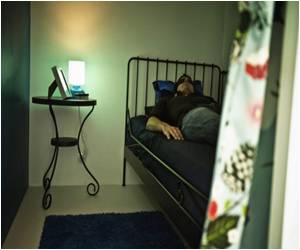Multiple sclerosis (MS) patients might assume that the fatigue they often feel just comes with the territory of their chronic neurological condition.

In the latest issue of the Journal of Clinical Sleep Medicine, researchers from the U-M Health System's Sleep Disorders Center report the results of a study involving 195 patients of the U-M Multiple Sclerosis Center.
In all, 56 percent of the MS patients were found to be at increased risk for obstructive sleep apnea, based on a method of screening for the condition known as the STOP-Bang questionnaire. But most had never received a formal diagnosis of sleep apnea, and less than half of those who had been told they had sleep apnea were using the standard treatment for it.
The authors also found that patients who were more fatigued were more likely to also be at elevated risk for sleep apnea – even after taking into account other factors that might have contributed to feelings of fatigue, such as age, gender, body mass index (BMI), sleep duration, depression, and other nighttime symptoms.
The research is based on patients' answers from a sleep questionnaire designed by the authors, and four validated instruments designed to assess daytime sleepiness, fatigue severity, insomnia severity and obstructive sleep apnea risk. Medical records also were accessed with patients' permission, to examine clinical characteristics that may predict fatigue or obstructive sleep apnea risk.
"We were particularly surprised by the difference between the proportion of patients who carried an established diagnosis of obstructive sleep apnea – 21 percent -- and the proportion at risk for obstructive sleep apnea based on their STOP-Bang scores, which was 56 percent," says the study's lead author, Tiffany Braley, M.D., M.S. "These findings suggest that OSA may be a highly prevalent and yet under-recognized contributor to fatigue in persons with MS."
Advertisement
Multiple sclerosis (MS) is an immune-mediated disease of the central nervous system that causes inflammation and damage of the brain and spinal cord. In addition to neurological disability, MS patients suffer from a number of chronic symptoms, the most common of which is fatigue. Fatigue is also one of the most disabling symptoms experienced by MS patients.
Advertisement
The standard treatment for obstructive sleep apnea, called continuous positive airway pressure, or CPAP, involves a machine and mask device that applies a stream of air to the upper airway to keep it open during sleep.
The patients in the study had an average age of 47 and had lived with MS for an average of 10 years. Two-thirds were female, consistent with the prevalence of MS in the U.S., and two-thirds were taking a medication to treat their MS. Three-quarters had the relapsing-remitting form of the disease.
Source-Eurekalert















